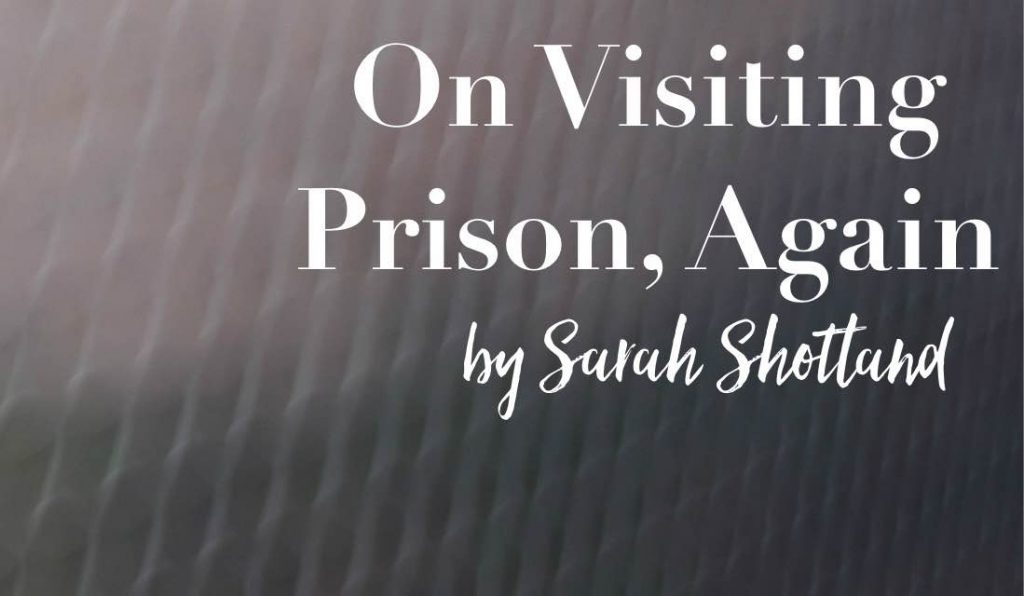 Sarah Shotland’s “On Visiting Prison Again,” won Proximity’s 2016 Personal Essay Prize. When selected, Judge Paul Lisicky described the essay as follows: “This is a piece by a writer who’s willing to be lost a little while. As readers, we encounter a mind at work: thinking, perceiving, questioning, bewildered. We’re invited into the speaker’s contradictions—her wish to be seen and known, her wish to be invisible—and get a window into an aspect of the American prison system that’s rarely represented, especially with such nuance and intimacy.”
Sarah Shotland’s “On Visiting Prison Again,” won Proximity’s 2016 Personal Essay Prize. When selected, Judge Paul Lisicky described the essay as follows: “This is a piece by a writer who’s willing to be lost a little while. As readers, we encounter a mind at work: thinking, perceiving, questioning, bewildered. We’re invited into the speaker’s contradictions—her wish to be seen and known, her wish to be invisible—and get a window into an aspect of the American prison system that’s rarely represented, especially with such nuance and intimacy.”
Proximity’s Editorial Fellow Jennifer Lang spoke with Shotland about the experience that inspired her essay and her writing process.
Your story, “On Visiting Prison Again,” is grounded in your experience teaching at a men’s prison for a program you founded in Pittsburgh. Can you tell me more about that program?
SS: Words Without Walls is a program within Chatham University’s MFA in Creative Writing program. We started teaching creative writing at Allegheny County Jail, in downtown Pittsburgh, in 2010, and now we serve about 300 people a year at the county jail, a state prison, and a residential drug treatment center for mothers and their children called Sojourner House. Graduate students who are earning their MFA teach the classes along with alumni and MFA faculty. We offer 18 classes per year to men, women and minors.
Along with a group of incredibly committed graduate students, I co-founded the program with the director of Chatham’s MFA program, Sheryl St. Germain. Since it began, everyone involved has told us how valuable and sometimes life-changing the experience is—the graduate students, the incarcerated students, our faculty at Chatham, people who hear the stories that come out of the program.
I’d love to hear about a typical class. How many inmates show up? Do you offer writing prompts or let them free write?
SS: I’ll talk about a typical class at the state prison, since that’s what the piece is about.
We have 20 students enrolled in the class each semester. On the first night, everyone is given a composition notebook and a pen. We do a combination of things with our class time, but usually a class involves reading a piece of poetry or short prose, discussing it, and then writing from a prompt based on what we’ve just read. At the beginning of class, we generally have time for people to share what they’ve written over the course of the week.
Our students at SCI Pittsburgh (the prison), are incredibly diverse. Some have been incarcerated for six months, and will be gone in less than a year. Some are serving life sentences. We’ve had students from India, Puerto Rico, Haiti, Bosnia. I’ve had students at the prison who are 19, and students who are in their late 70s. Every color, class, region of the country, level of education, religion. In most creative writing classrooms, whether on or off campus, that’s not the case. For us, that means the discussions about literature are rich and interesting, and the kinds of topics people are interested in are very varied. It leads to challenging and rewarding conversation and creative output. Our classes at the prison are two hours, once-a-week, and run for 12 weeks. We’re on the same academic calendar as Chatham, so we have a class every Fall, Spring and Summer.
Is the work from these inmates publishable?
SS: Yes, definitely. Words Without Walls publishes chapbooks of our students’ work each year. We also have several students and former students whose work has been published independent of the program by major contests, presses and journals. We’ve had three PEN America award winners, which is a huge platform for our students.
What made you submit the story for the themed issue INSIDE|OUT?
SS: When I saw the call for INSIDE|OUT, I knew it was the perfect topic for the essay. The words inside and outside are so often used in prison culture, and the line that delineates insiders and outsiders is more stark in a prison than in other places. There’s a literal wall dividing the space that marks “free” and “caged.” It’s also been interesting to understand and recognize what qualities create insiders and outsiders inside the class; identifying as a creative person and recognizing someone else’s creative identity often means there are unexpected friendships and allies created through the class—perhaps that’s one of the less obvious ways the piece fit the INSIDE/OUT theme. As a writer, you rarely find a call for work that’s as perfectly suited as this one was for me.
Why did you choose to write in second person and present tense?
SS: It wasn’t obvious, but second person does allow me a little bit of distance to observe from an almost outsider perspective, and since the piece is in part about insiders and outsiders, I think that distance makes sense. The present tense is important because there’s a fair amount of reflection and exposition in the piece, and the present tense hopefully cuts through that and makes it a little more immediate.
How has working in the prison influenced your work as a writer?
SS: Yes, working in a prison has influenced almost everything in my life, including my writing. I think it’s made me a more thoughtful person and writer. I am far more likely to take my time with a piece now, rather than rush to revise and submit it for publication. I think that’s because working with incarcerated people has taught me about a kind of radical reflection that takes place when you’re serving time. The men who have impacted me the most in prison have been the ones who have generously shared their stories with me, and usually those stories involve a transformation that took place because of an intense period of reflection. Being impacted by their stories has made me more reflective in my day-to-day life, which translates into my writing life as well. I’m really looking for the transformation that might be possible in myself, in a character I’m writing, or in the piece itself. My process has become slower, more reflective, more meditative and I hope more thoughtful and open-minded.
 SARAH SHOTLAND is the author of a novel, Junkette, and a playwright whose work has been produced nationally and internationally. She teaches in the MFA program at Chatham University and is the co-founder of Words Without Walls, which brings creative writing classes to jails, prisons and rehabilitation centers in Pittsburgh, Pennsylvania. ☆ Judge Paul Lisicky selected “On Visiting Prison, Again,” as winner of Proximity’s 2016 Personal Essay Prize.
SARAH SHOTLAND is the author of a novel, Junkette, and a playwright whose work has been produced nationally and internationally. She teaches in the MFA program at Chatham University and is the co-founder of Words Without Walls, which brings creative writing classes to jails, prisons and rehabilitation centers in Pittsburgh, Pennsylvania. ☆ Judge Paul Lisicky selected “On Visiting Prison, Again,” as winner of Proximity’s 2016 Personal Essay Prize.
 American-born, French by marriage, and Israeli by choice, JENNIFER LANG writes mostly about her divided self and search for home. Her stories have been published in Under the Sun, Hippocampus, and Dumped: Stories of Women Unfriending Women, among others. Occasionally, she contributes to the Wall Street Journal‘s expat blog. Since obtaining an MFA from Vermont College of Fine Arts in summer ‘16, she devotes most of her time to finishing her first memoir.
American-born, French by marriage, and Israeli by choice, JENNIFER LANG writes mostly about her divided self and search for home. Her stories have been published in Under the Sun, Hippocampus, and Dumped: Stories of Women Unfriending Women, among others. Occasionally, she contributes to the Wall Street Journal‘s expat blog. Since obtaining an MFA from Vermont College of Fine Arts in summer ‘16, she devotes most of her time to finishing her first memoir.
Leave a Reply